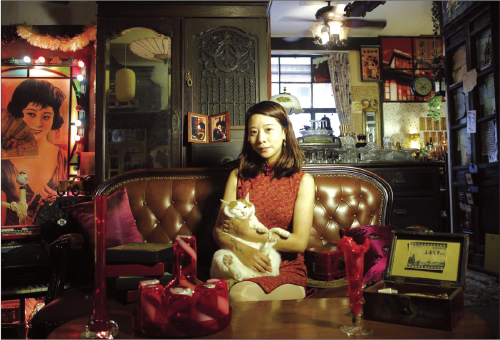Shanghai is a city with an eye to the future-but some residents are nostalgic for times past. Wu Ni chats to a 'retro-holic' who is collecting pieces of the lost city.
 |
| Wang Xiaojia's museum, called Shanghai 1937, displays a variety of things that showcase the golden days of old Shanghai. |
For many Shanghai natives, nostalgia is a natural reaction to the rapid and drastic changes that are happening to the city. Wang Xiaojia went a step further-she built a museum to commemorate the golden days of old Shanghai.
The museum is hidden away in the middle of a residential compound for war veterans. Stepping inside, one is immediately transported into the past, with a nostalgic atmosphere created by the dusky lighting, slow jazz melody and thousands of items reminiscent of old Shanghai.
They include qipao, or cheongsam, the popular dress among socialites and upper class women in the 1920s in Shanghai, rusty tin boxes for cigarettes, vintage watches and bags, and complete household articles used by old Shanghai families from glassware to ashtrays, light bulbs, wash basins, thermoses, sewing machines and wardrobes.
Wang named her museum Shanghai 1937, an era in her eyes when the city's prosperity rivaled Paris and New York, but was interrupted by the invasion of the Japanese army.
Wang's family has lived in Shanghai for generations. Born in the 1980s, she grew up in a traditional stone-arched Shikumen lane house. As skyscrapers and shopping malls gradually took over the city, the old houses were demolished, big families dispersed and things that she was familiar with disappeared.
She started to collect the old-fashioned items and accumulated so many things that they piled up in a storehouse. Her brother, a photographer, had a vacant photo studio that she thought could be a perfect space to display her collection.
The 200-square-meter studio was transformed into a tiny museum that unexpectedly became a popular destination for those who are fond of local culture and seek old Shanghai flavor.
"These exhibits are not expensive or rare, but people feel intimate with them," Wang says. "Visitors are reminded of the times past and beautiful memories."
Wang recalls a middle-aged woman who bought a cassette of Fei Xiang, or Kris Phillips, the renowned Chinese-American pop icon who was popular on the Chinese mainland in the 1980s.
"She said the singer was her idol when she was young but she could not afford the cassette. Now she had fulfilled her girlhood dream, although the cassette was shabby and the sound quality not satisfactory," Wang says.
